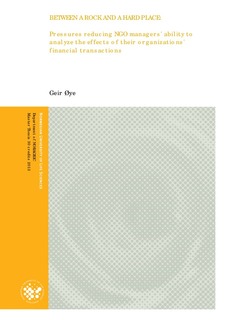Between a rock and a hard place : pressures reducing NGO managers' ability to analyze the effects of their organizations' financial transactions
Abstract
The purpose of this research has been to study factors, both internal/organizational as well as external, that can reduce NGO managers’ ability to critically analyze the effects their organizations’ financial transactions can have in the contexts where they are operating. Literature suggests that an awareness of the political economy in the local settings is crucial to avoid potentially negative effects of the influx of resources that aid represents. Resources are prone to be exploited and when aid and resources is distributed in a careless manner, it can have detrimental effects.
This study found that internal factors such as low, relevant experience of expatriate managers, high turnover and insufficient introduction programs within the studied NGOs, were factors reducing the managers’ ability to analyze the effects their organizations’ financial transactions had in the local context. Further, the study also found that there was an inherent conflict between the operational programs and administrative support units, a conflict that led to conflicts and tension on a regular basis. The pressures to deliver within the organizations, led to situations where the organizations’ rules and regulations, as well as the requirements laid down in contracts with donors, were broken on a regular basis. This would typically happen by bypassing procurement regulations and also window dressing, an activity involving production of documentation that would give the appearance that proper procedures had been followed.
External pressure from donors was also found to reduce the analytic capacities of the NGOs. The study found that increasingly excessive reporting requirements would skew attention away from the NGOs’ obligation towards their beneficiaries. The increased focus on anti-corruption measure was also found to have unintended consequences. The study found that the way the donors’ “Zero-tolerance” policy was operationalized, actually gave strong disincentives against NGOs to detect and report corruption. Ironically, the study also found that despite the increasing administrative demands put on the NGO’s, the donors’ willingness to fund administrative functions was decreasing.
The thesis concludes that the finding of internal pressures as well as the pressures from the donors, actually reduced the ability of the managers of NGOs to analyze the effects of their financial transactions.
